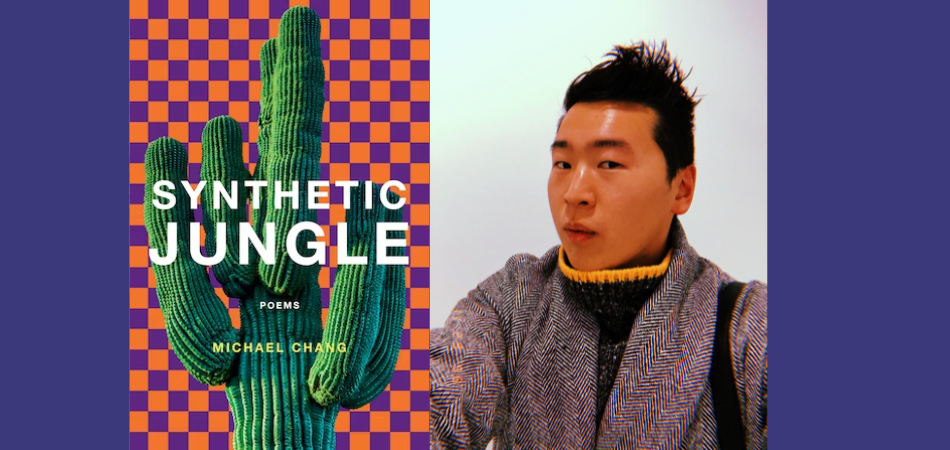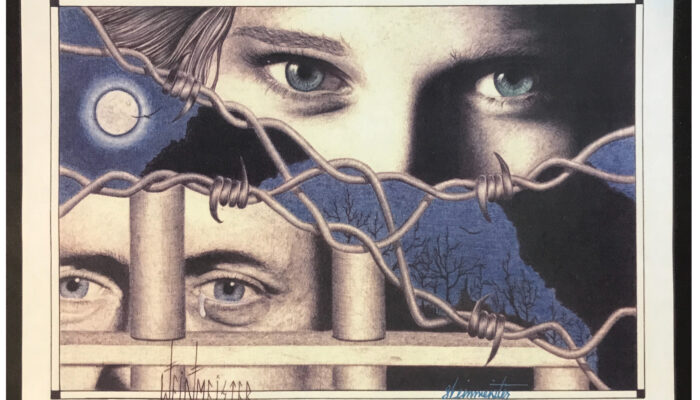Fence Poetry Editor Michael Chang is a stylish voice: familiar to many yet startlingly fresh. Chang’s debut collection drew immediate comparison to the range and wit of John Ashbery and Frank O’Hara. This past fall, Chang’s Almanac of Useless Talents was published to early praise, a collage of poems that referenced everything from world politics, celebrity gossip, and even potshots at contemporary poets by parodying their style with flourish. In their work, Chang breezes by with such natural ease of wit that you could finish this encyclopedic collection in one sitting and still want more. Their latest collection is Synthetic Jungle (Curbstone Books), a surprising culmination of Chang’s previous work, cycling through styles, topics, and tone, becoming more confident and kaleidoscopic with each turn of the page. Playful, critical, and intimate, Michael Chang’s poetry stands out as a vital sea change on the American poetry scene.
Right before the release of Almanac of Useless Talents, Chang took the time to chat with me at 2nd Ave Deli in New York City about their rise to literary eminence and the state of American poetry today.
—Zachary Issenberg
Zachary Issenberg: I’m meeting you just a few weeks before the release of Almanac, and a few months before the release of Synthetic Jungle, and it’s only been just over a year since the release of your first book. That’s a big jump in small time, does it feel like anything’s changed?
Michael Chang: It doesn’t feel like a big change, each book serves a different purpose. I’m still doing what I’ve been doing, that is to say, making stuff I would want to read—I don’t think when or where something gets published affects me.
ZI: But aren’t you excited?
MC: Of course I’m excited, but I’m mostly excited that more people will get to see it. I don’t think that speaks to some value judgment, but being able to bring it to more people, having the work seen is great.
ZI: If each book has its own purpose, what is it about these two books that you are most excited people get to see?
MC: What people are going to see is writing that’s funny, refreshing, speaking to the moment we’re in—but they all feel like different books, where [my first book] Boyfriend Perspective is bigger, with its tone and registers, Almanac feels like the opposite, while Synthetic is somewhere between them.
ZI: But each of your books have those qualities: funny, flirty, scathing. Would you say that there’s a particular style to it all?
MC: It sometimes feels like each of my books isn’t different from the others, rather like they’re each a piece of a much larger project. They’re distinct and discrete, I don’t try to describe a particular collection as focused around one topic or another.
ZI: You are right about Boyfriend, it’s maximal in style, swinging between forms and topics, and you’ve parsed down since. Was that maximalism the result of it being your first book?
MC: There’s always an insinuation about the first book that people have, but I wanted to have something big and ambitious, more of a full range, an introduction of sorts, that line in the sand kind of thing. I did have two chapbooks before that, but it being a full-length meant that it required a certain undertaking.
ZI: Did you always have an idea for this larger project?
MC: I think a lot of other writers have disjointed projects, because they feel that it’s their one and only shot, their last book, whatever. That wasn’t something that occurred to me, because I know for myself there will be more books. I can write without this pressure of I have to say everything with this one thing. And so, it becomes just another outlet to express myself. I write about things that I obsess over, and those can change.
ZI: What poets are you reading and responding to?
MC: I never answer that because I can’t leave anyone out. But I’m not exaggerating when I say that I read everyone. I even hate-read.
ZI: When did Ashbery enter your life, and what about his poetry did you pick up?
MC: Pretty early on. He was one of the first poets I really got into, creating his own vocabulary, not caring if people “got it.” Even among his peers, his friends, which I imagine was tough in that cloistered “New York School” environment. You have to keep your own aesthetic.
ZI: Is it necessary for your style to be lonely?
MC: No, you have to know what your peers are doing. You have to be hyperaware of what they’re up to, what they’re thinking about, but also have your own muses and interests. It’s not that you shouldn’t be in conversation with their work, but you should always be confident about doing your own thing. It’s boring otherwise.
ZI: Do you enjoy writing poems that kick the knees of other poems?
MC: In general, poets care too much about what other people think, and so tend to sound the same. When poets take themselves too seriously, it’s cringey.
ZI: How do you earn seriousness after all this play? Synthetic Jungle will pin and strike a ton of contemporary poets and pop idols, and then have this massive poem about immigration and the justice department.
MC: I think the treatment can’t be serious. These are always serious topics, but how we talk about some of these things doesn’t have to be. I want people to feel informed, but I don’t want to be talking at somebody. I try to have a conversation about X, Y, and Z, without judging the reader.
On the part of the poet, there’s the bad habit of talking about these things in a very repetitive and common way, leaning on identity or biography or—worse—other people’s biographies. On the part of the reader, it’s scary because it doesn’t engender dialogue and often starts from an adversarial, less hospitable place. I think it’s easier if people don’t feel judged or “not allowed” to have certain opinions, and from there you can get them to meet you, maybe come out the other side being more informed or aware.
ZI: How do you get someone to open up?
MC: Pay attention to how a poem looks on the page, and by being unique, or interesting, or fun. There’s something about that that puts people at ease, usually through the use of humor. I’ve also found it useful to begin from a place where the reader learns what you’re about, when you’re being candid. I think people are more willing to share if they don’t think you’re bullshitting them. By being forthright, it doesn’t feel like you’re quizzing them or seeing if they measure up. That’s why I try to be forthright, maybe my point reaches them or sparks a thought that, down the line, impacts their conversation with someone else or changes their perspective in a quiet way. These things don’t have to be an immediate epiphany.
ZI: Speaking of epiphanies, another facet of your work consists of brief, refreshing, sapphic love poems, that usually cut just before the moment of realization. What’s going on there?
MC: There’s room for more imagination that way—it’s fun to leave people hanging. They’re unusual poems in that they are optimistic, too. It’s a good kind of anxiety where, if you’re an inward-looking person, that’s an opportunity or invitation to look at yourself, and if you’re outward-looking, you can redevelop how you look at someone else or your outlook entirely.
ZI: What’s with the texting style?
MC: What do you mean?
ZI: The whole “u r,” “iz”, “ur,” you use in many poems.
MC: Oh, that goes back to disrupting people’s expectations of what poetry can look like or talk about or do. It’s organic to how people talk. It’s also how I talk, how I am. You have to meet people where they are, but also speak to how you are, and “text speak” or whatever brings the world together for me. Even in my prose-y poems, which may appear more traditional, I break with standard punctuation and play with convention that way.
ZI: How much do you edit?
MC: Not very much. My poems are complete when they’re written, that’s how they come out, so just nips and tucks, cosmetic edits here and there.
ZI: You are known for being extraordinarily prolific, writing almost daily. When did that start?
MC: In earnest after the first book came out, when I saw that people liked it and were interested in seeing more from me. I would be doing what I’m doing regardless, but it became an ongoing conversation with myself about where I want the art to go, how I want to push my practice forward.
ZI: What sort of conversations did you have with yourself during that first book?
MC: I was very invested in the entire bookmaking process. The first chap won a contest, and got published as part of that. It was kind of my introduction to bookmaking—and this isn’t a complaint—where I didn’t have full creative control. It was useful to learn the parameters around details like font, cover art, and the like. So starting with limitations and working from there in later projects, having more flexibility—that was important to learn.
ZI: Is that something you think other young poets should experience?
MC: Yeah, it’s why people like prompts. If somebody’s stuck, maybe form can be an opening.
ZI: Starting out, did you need prompts?
MC: No. You should always start with having something to say, and I knew what I wanted to say at a particular moment, in a particular moment, and it wasn’t something I was really seeing around me or “out there.”
ZI: It’s interesting to me when you say “particular moment,” because across your works, you have this way of referencing contemporary politics, poetry, and pop culture, without really addressing it. You skirt the conversation, while revealing this damning criticism. Where does that come from?
MC: The gratification comes from doing something that no one else is doing. I introduce or reference pop culture in a non-gimmicky way that’s interesting to me on a personal level.
ZI: Did someone like Ashbery provide you a rubric for that?
MC: Well, I know more about the nuts and bolts of politics than Ashbery would’ve known, so the calculus is a little different. I’m not necessarily talking about what other poets do—it’s just how I think about these things, and putting them through this kind of process, where I take pop culture and politics and put them through this sort of centrifuge, seeing what comes out. That’s different from writing in a way that’s expected of you or some forced import or transplant of politics to score points.
ZI: With your day job in politics, did you learn anything from seeing how people react on the inside versus how a reading audience would react?
MC: A little of both. It reinforced a sort of unwillingness to be overly cynical, because that’s the easy thing to do. Really, I think having worked in and outside of government—it’s weird. People assume that if you work in government, you’re a bum, and you don’t do anything, and you just get paid even if you don’t show up, and you half-ass it when you’re there, and you’re rarely there. In a way, it sucks, because people think you’re shit anyway, but it’s also liberating, because people think you’re shit anyway. The critiques are already there, it’s freeing.
ZI: How did that impact your poetry?
MC: I don’t want to say “I don’t care,” but if you’re going to come in with these misconceptions or accurate feelings for it, then I might as well just—
ZI: Oh, so “misconceptions or accurate,” so there is some intentional ribbing?
MC: All of that is to say: you can do what you want.
ZI: But from where I’m sitting, you’ve got a wide range of support; people do get it. Is this a fear built into the process?
MC: You just have to find the people that get it.
ZI: So you’ve always been successful?
MC: Well, that sounds arrogant. I always go back to gratitude—I am really thankful for the support. Everyone has their own process, and they should own that, regardless of the criticism. Just keep doing what you’re doing, honestly, and these things have a way of sorting themselves out.
This conversation has been condensed and edited for clarity.




